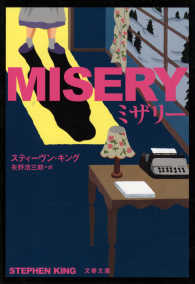Full Description
Creating New Possibilities for the Future of HBCUs brings together over 20 higher education scholars with more than 150 years of combined professional experience to critically examine the current contributions of and future directions for our nation's 101 historically Black colleges and universities (HBCUs). The book breaks new ground on Black colleges and offers hope and optimism for charting their future despite shrinking investments in higher education, declining enrollments, and eroding public confidence in the value of a college degree. The book was written to tell the truth, to right (or '[re]write') past wrongs about HBCUs, and to shift our collective gaze from the uncertain, shaky past of a select few to a far more promising future for all based on insights from contemporary empirical research.
Each chapter addresses a particular aspect of higher education as it relates to HBCUs, documenting the undeniable legacy of Black colleges, their current challenges and untold successes, blended with findings from recent empirical studies—both quantitative and qualitative—that clearly create new possibilities for the future of HBCUs. This volume was developed to break new ground on often overlooked and understudied terrain in higher education scholarship.
Organized into three major sections, the book includes chapters focusing on HBCUs as institutions and a small, but consequential, segment of the higher education enterprise. Section Two consists of 6 chapters addressing the experiences of HBCU students, paying close attention to issues of intersectionality, heterogeneity, and race/ethnicity, to name a few. A third, and final, section turns much-needed attention to HBCU personnel, including campus administrators, college presidents, and faculty. Rich in its coverage of culture, facts, and past history, this new book offers much to those interested in charting new possibilities for the future of HBCUs.
Contents
Preface.
Foreword; Walter Kimbrough.
Acknowledgments.
Section I.
Chapter 1. Introduction; Terrell L. Strayhorn.
Chapter 2. Selective Historically Black Colleges and Universities: A Competitive Option; Tiffany Blacknall and Jennifer M. Johnson.
Chapter 3. Mission (Im)Possible: The Contemporary Role of Historically Black Colleges and Universities in the United States; Terrell L. Strayhorn and J'Quen Johnson.
Chapter 4. Black Male Graduate Student Socialization at HBCUs: An Exploratory Survey Analysis; Royel M. Johnson.
Section II.
Chapter 5. I Am Somebody: A Qualitative Study of Self-Esteem Development Among Students at Historically Black Colleges and Universities; Jameel A. Scott, Jamie R. Riley, and Robert T. Palmer.
Chapter 6. I Think I Can: Using Self-Efficacy Theory to Study the Socialization of Doctoral Students at HBCUs; Michael Steven Williams.
Chapter 7. Understanding the Crooked Room: Empowering New Possibilities for Research About Women and Gender at HBCUs; Deirdre J. Rosenfeld.
Chapter 8. Trends in Science, Technology, Engineering, and Math (STEM) Participation Among Black Students at HBCUs; Leroy L. Long, III, Fei Bie, and Todd M. Suddeth.
Chapter 9. If They Ask, Don't Tell: Confessions of Black Gay Men at HBCUs; Terrell L. Strayhorn.
Chapter 10. The Tale of Two Institutions: An Examination on White Student Engagement on Public HBCU campuses; Joelle Davis Carter.
Section III.
Chapter 11. The Invisible: Administrators and Their Work at HBCUs; Nicole J. Johnson.
Chapter 12. Shortened Tenure: Avoiding the Derailment of Historically Black College and University Presidents; Derrick L. Tillman-Kelly.
Epilogue; Terrell L. Strayhorn.








